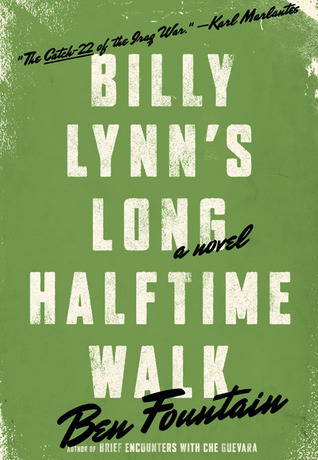What do you think?
Rate this book


307 pages, Hardcover
First published May 1, 2012



They hate our freedoms? Yo, they hate our actual guts. Billy suspects his fellow Americans secretly know better, but something in the land is stuck on teenage drama, on extravagant theatrics of ravaged innocence and soothing mud wallows of self-justifying pity.But the soldiers know that they are mere pawns:
“Everybody supports the troops,” [Sergeant] Dime woofs, “Support the troops, support the troops, hell yeah we’re so fucking PROUD of our troops, but when it comes to actual money? Like somebody might have to come out of pocket for the troops? Then all the sudden we’re on everybody’s tight-ass budget. Talk is cheap. I got that, but gimme a break. Talk is cheap but money screams.This is not a cheery depiction of America. Warts are on display, maybe on the Jumbotron along with videos of Bravo in battle, and ads for everything. It is the nation in microcosm, with the soldiers just another prop pumping up the consumer to buy product, whether that be deodorant, sex or a nifty new war.

Billy tries to imagine the vast systems that support these athletes. They are among the best-cared for creatures in the history of the planet, beneficiaries of the best nutrition, the latest technologies, the finest medical care, they live at the very pinnacle of American innovation and abundance, which inspires an extraordinary thought - send them to fight the war! Send them just as they are this moment, well rested, suited up, psyched for brutal combat, send the entire NFL! Attack with all our bears and raiders, our ferocious redskins, our jets, eagles, falcons, chiefs, patriots, cowboys - how could a bunch of skinny hajjis in man-skirts and sandals stand a chance against these all-Americans? Resistance is futile, oh Arab foes. Surrender now and save yourself a world of hurt, for our mighty football players cannot be stopped, they are so huge, so strong, so fearsomely ripped that mere bombs and bullets bounce off their bones of steel. Submit, lest our awesome NFL show you straight to the flaming gates of hell!I really liked Billy Lynn’s Long Halftime Walk. It packs a great deal of thought into a rather surreal story: the visit of a heroic army unit to Dallas Cowboys football game on Thanksgiving. There is an engaging set of characters, most of all 19-year-old Billy Lynn, who not only ring true but provoke genuine interest and sympathy. Without feeling forced, this book raises so many questions about what makes a hero in war, the way America 'loves' its soldiers while sending them into combat, the hypocrisy and violence in our culture, and the bond between solidiers. Somewhere, I hope Billy and Faison are together. Highly recommended.
"Mango grins, cuts Billy a look. 'Dude,' he tells Hector, 'we already going back.'
Hector squints. 'Shittin' me.'
'Shit you not. Leaving Saturday.'
'The fuck you gotta go back.'
'Gotta finish our tour.'
'The fuck! The fuck you gotta go back, after all you fuckin' done, fuckin' heroes? Where's the fuckin' right in that? You guys done kicked your share a ass, like when's they let you just coast on out?'
Mango laughs. 'The Army don't work that way. They need bodies.'
'Shit.' Hector is scandalized. 'For how long you gotta go?'
'Eleven months.'
'Fuck!' Sheer outrage. 'You wanna go back?'
The Bravos snort.
'Man. Fuckin' harsh. That just ain't right.' Hector casts about. 'Ain't they supposed to be making a movie about you?'
Uh huh.
'And you still gotta go back? Fuck, so what happens if you, uh, you, uh-'
'Get smoked?' Billy offers.
Hector turns away, stricken.
'No worries, homes,' Mango says, 'that's a totally different movie.' "
“No matter their age or station in life, Billy can't help but regard his fellow Americans as children. They are bold and proud and certain in the way of clever children blessed with too much self-esteem, and no amount of lecturing will enlighten them as to the state of pure sin toward which war inclines. He pities them, scorns them, loves them, hates them, these children. These boys and girls. These toddlers, these infants. Americans are children who must go somewhere else to grow up, and sometimes die.”